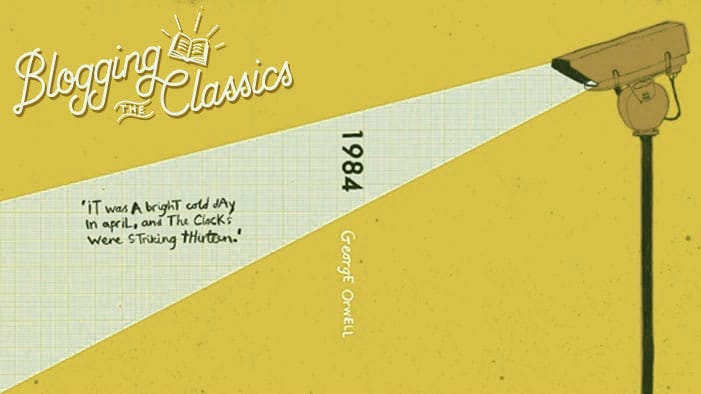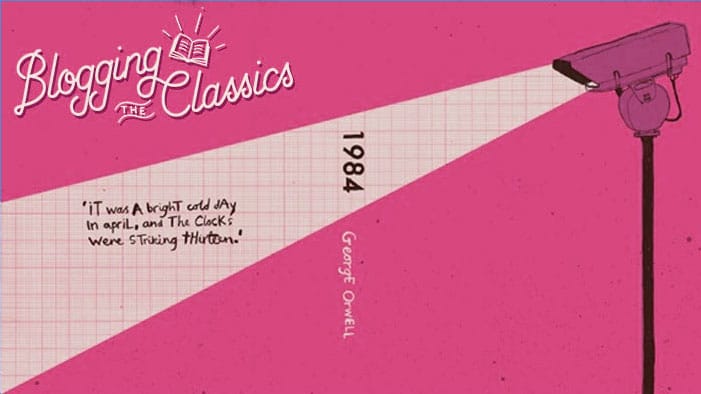Blogging 1984: XI, The END (of the World As We Know It)

Previously in Blogging 1984, we went inside Room 101 and it was the biggest letdown since we saw the Red Room of Pain in the 50 Shades of Grey film adaptation (there was a cage of rats that almost got strapped to Winston’s face, but in small graces, we didn’t have to go there because he threw his love, Julia, under the bus).
VI
Fresh from his stint at the Orwellian Betty Ford Clinic (minilove), Winston sits alone at the Chestnut Cafe. He drinks crappy Victory Gin in the waning sunlight, spurned by all others at the cafe who are put off by his bald, pink pate and sickly body. As readers, we have been privy to more intimate description of Winston’s body than we ever thought we could endure, and know how generally decrepit his skinbag is, but Winston’s all, “I woke up like dis.”
His time at the cafe seems to subsist of drinking bottomless saccharine gin, doing the Times chess puzzle, worrying about the war effort abroad, and fighting off momentary blazes of consciousness. The description reminds me most of Parsons. Vague bubbles of dissonance stir deep inside him, but Winston is about as sentient as a self-driving car. This snippet refers to the people from his life:
“He never named them, even in his thoughts, and so far as it was possible he never visualized them.”
The dehumanization of Winston being apparently complete, George Orwell can’t help but lay a slighter thicker layer of Marmite on the text than we probably needed:
“Something was killed in your breast: burnt out, cauterized out.”
Got it, George.
From here, we shift into impersonal discussion about “he” and “she” because we have destroyed the people who formerly stood in their place. ~subtle~ He (Winston) ran into her (Julia) one vile March day. She was fundamentally altered:
“Her face was sallower, and there was a long scar, partly hidden by the hair, across her forehead and temple; but that was not the change. It was that her waist had grown thicker, and, in a surprising way, had thickened.”
Good HEAVENS, she is on her way to a pair of powerful mare-like buttocks. The subtext of this change is that where Julia had been a sort of potent loose cannon of sexual energy and wild proponent of naked Tuesdays, she has been neutered. Her appeal, her sexuality, her lithe young waist, have been replaced by a hardy utility. The next time someone falls under a wagon, Julia can probably pull a Jean Valjean and lift the axle right off, for she is a matron. Maybe now her hips can bear children, but as a producer of human capital, rather than as a mother—
I arrive at the park
waist: thick
breast: cauterized
soul: out
I am forcibly removed from the premise of this novel.
You might think I’m reading too much into a brief description of a female’s waist, but you obviously didn’t live through the peplum craze.
Julia and Winston tell each other they betrayed each other, and the dialogue is worthy of Nashville:
“‘I betrayed you,’ she said baldly.
‘I betrayed you,’ he said.”
Understandably bummed, Winston had returned to the Chestnut Tree, where he has a seat and a gin. The gin “had become the element he swam in. It was his life, his death and his resurrection.” Orwell lays his sarcasm hand heavily ‘pon the text here, invoking religion where there is only hopelessness and nihilism. As Winston sits there sipping his terrible gin, the folk song that has tinkled through the story comes on again—
“Under the spreading chestnut tree
I sold you and you sold me”
—and we are reminded that 1984 is The Hunger Games if that series had ended with Peeta permanently hijacked and Katniss giving up and becoming a bookkeeper for the Peacekeepers. To pay for his gin, Winston now works on a sub-committee of a sub-committee at the ministry, worrying about inconsequential things like whether to put commas inside brackets as they go about tackling the Eleventh Newspeak Dictionary. He’s a public servant, but in a zombie-slave kind of way.
Just now, he has a flashback to a childhood memory, and even though I REALLY DO NOT WANT to go into Winston’s pensieve right now, I of course must.
He remembers a crappy day as a nine-year-old in which his mother brought home a cracked snakes and ladders board game as a present. Winston’s impulse was to pretend he couldn’t care less, but he winds up playing it with his mother and sister all afternoon long, laughing and delighting in the simple things. Oh how they laughed.
So this memory was not so bad! Except:
“He pushed the memory out of his mind. It was a false memory.”
A bulletin interrupts Winston’s introspection and announces an almighty victoryâ„¢ in Africa. Everyone is thrilled, total victory is within sight! Winston looks up at a poster of Big Brother and “two gin-scented tears trickled down the sides of his face.”
He looks at the poster with admiration:
“It was all right, everything was all right, the struggle was finished. He had won the victory over himself. He loved Big Brother.”
Here the book ends. (Well, other than the damned Appendix, containing “The Principles of Newspeak,” an account of the Eleventh Newspeak Dictionary, which eliminated unorthodox thought by 2050, but I cannot, I will not.)
There and back again, indeed. We began the novel with Winston’s fledgling efforts to crack his way out of the mental walnut shell Big Brother had placed him in, and here he returns to it, more or less willingly. The bounds of his mind have opened up to permit memories, feelings, love, and horrid confessions about the state of his body, and now collapse back upon themselves like flower petals closing as the sun drops low in the sky.
Of course there are questions:
- Is Oceania even a thing? Are the three superstates a fiction designed to focus populist energies on an external enemy rather than their oppressor? Certainly the surprise victory on the front in Africa at the end of the book seems entirely fictional, which calls into question the entire narrative about areas of conflict. Inasmuch as the actual answer to this question matters, I would say “no.”
- Why save Winston? We know that other people have disappeared—to camps, to piles of shrapnel—but O’Brien explained that reforming Winston’s mind was crucial to the Party’s project to stamp out heresy. Winston seemed pretty harmless to me, but okayyyyy. See, part of the difficulty in reading the book is that because Winston is our only guide (/unreliable narrator), we cannot really know what came before, or what happens in the grander scheme of things. Has he been to the Ministry of Love before? Maybe! Why else would his memories have been so nicely repressed in the first place? Why is Winston our guy?
- Is there any hope for rebellion in the future? The distant future? Orwell reallllyyyy doesn’t give us much reason to hope. The Proles seem easily distracted by football and beer, even though they far outnumber the Inner and Outer Party members. Orwell, who was basically on his death bed when he wrote this book (had that tuberculosis glow) made things fairly well as depressing as he could, presumably to shock us real-world citizens into action against fascism. He was also, let us not forget, British. And the Brits do a dry depression like no one else.
- Could 1984 really happen? My #currentmood is grim.
Well, comrades, we did it. We forded a novel built on Physical Jerks; brief, terrible sexual encounters; mass hysteria; long, ossifying chapters on Marxism; cabbage water; torture; face-cages of rats; love; loss; and totalitarianism.
*weak cheer*
I feel very sure that this book is important and relevant to now (as opposed to just the west post-WWII), but I also want nothing more than to enjoy a scone w jam and cream while singing early Beatles songs and riding a pennyfarthing in plaid. Thank you for accompanying me through this hellscape; it has been a pleasure.
How are you feeling, now we have surmounted the great Orwellian classic?
Find all of Janet’s 1984 blog here, and find our Blogging the Classics index page here.













